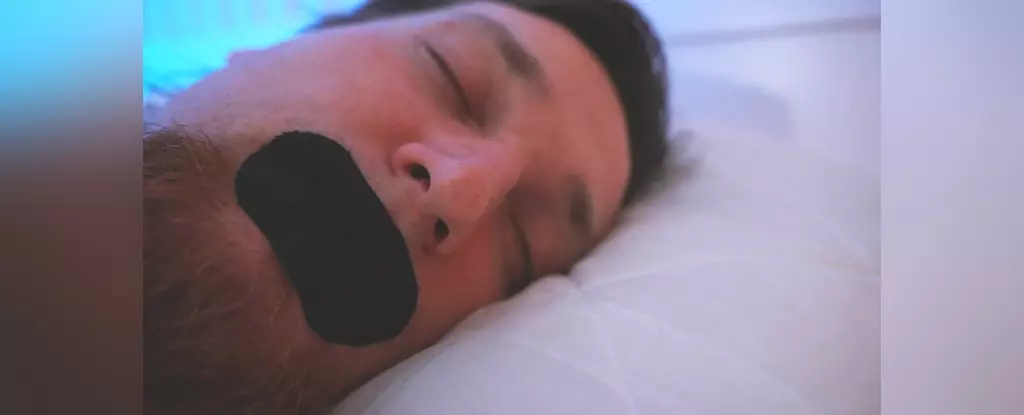In today’s digital age, social media is flooded with quick fixes and life hacks that promise a transformation with minimal effort. One of the latest trends gaining traction is “mouth taping.” Influencers and vloggers enthusiastically showcase this technique as a miracle method for various concerns, particularly when it comes to enhancing sleep quality. The premise is simple: by applying a specialized medical tape to keep the mouth shut overnight, users hope to transition from troublesome mouth breathing to a harmonious nasal breath, purportedly resulting in myriad health benefits, including improved jawline definition, enhanced energy levels, and even better oral hygiene. However, is this viral trend more than just a glossy filter over a more complex issue?
The Science Behind Sleep and Breathing
Before diving into the effectiveness of mouth taping, let’s take a step back to understand the link between breathing and sleep. Mouth breathing, particularly during sleep, can lead to various issues, including snoring and obstructive sleep apnea (OSA). OSA is characterized by repeated interruptions in breathing during sleep, ultimately resulting in fragmented and unsatisfactory rest. This is not just a nuisance but can also have serious implications for overall health, contributing to conditions like hypertension and cardiovascular disease. Therefore, the inherent need to find a solution to these problems is understandable; after all, who wouldn’t want a peaceful night’s sleep?
Yet, the enthusiasm around mouth taping lacks robust scientific endorsement. Recent research critically examines the effectiveness of this method and highlights a significant gap between social media claims and clinical realities. While some studies reflect marginal improvements in patients with mild cases of sleep apnea, the broad spectrum of health literature raises serious concerns regarding mouth taping.
The Counterproductive Risks
One of the significant issues with the mouth taping trend is the potential for it to act as a mere band-aid solution. If an individual suffers from nasal obstruction due to blockages from conditions like sinus infections, deviated septums, or nasal polyps, simply taping the mouth shut, while intending to promote nasal breathing, may inadvertently escalate health risks. In extreme cases, individuals could be putting themselves in danger by limiting airflow entirely. The researchers behind the studies emphasize this risk, noting an increased likelihood of asphyxiation for those with existing nasal blockages—essentially mitigating one symptom while ignoring another that could lead to severe consequences.
Moreover, the existing body of research evaluating mouth taping is dishearteningly poor in quality. Many studies lack crucial follow-ups, utilize non-representative sample groups, and fail to account for confounding factors that could significantly skew results. This means the few studies that suggest some benefits also carry substantial limitations, painting an incomplete picture at best.
Seeking Real Solutions
Navigating sleep issues requires more than just plastering a trendy fix over the symptoms. For individuals who genuinely struggle with breathing issues during sleep, a comprehensive approach is not only the most logical but also the most effective. The reality is that self-diagnosis backed by social media can lead down a rabbit hole of misinformed choices. Those who suffer from sleep disturbances are best served by consulting healthcare professionals. A thorough evaluation can lead to a tailored approach that addresses the root causes of sleep apnea or other breathing issues.
Whether that means undergoing a formal sleep study or exploring alternatives, the emphasis should remain on quality care and a clear understanding of one’s health. Skilled professionals can offer insight into appropriate interventions, ranging from lifestyle adjustments and therapeutic techniques to CPAP devices, which are tried-and-true methods for addressing OSA.
The Verdict on Mouth Taping
While the allure of quick fixes is undeniably appealing, mouth taping falls short under scrutiny. The promise of a simple solution to complex health issues often leads to disappointment and exacerbates underlying problems. For a truly restorative sleep experience, it is essential to prioritize evidence-based methods and professional guidance over trendy hacks. Ultimately, when it comes to health and wellness, investing in sound practices is far more beneficial than succumbing to viral allure.


Leave a Reply